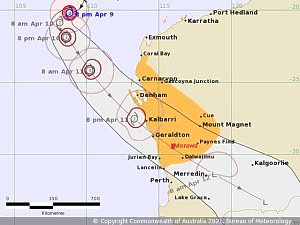
Caught in a Cyclone
An account of experiences during Cyclone Seroja
It was initially something to look forward to: a trip north to visit family we hadn't seen for years. The drive would be a long one for us, the like not experienced since we gave up fruit-picking ten years previously. Back then, we regularly took 800 kms a day in our stride; but in recent times even the 150 kms to Perth was becoming a bit of a haul. Needless to say, the prospect of having to drive over 500 kms was somewhat daunting. The ultimate destination was Morawa, a small town in the mid-west wheatbelt. We had gone through there in the past while on our travels, but had never stayed; so it promised to be an interesting addition to our memoirs. It was certainly that, and much more.
As this was during the Easter break, we decided to stop over at our daughter's place, which would give us the opportunity to see the grandchildren while they were still on school holidays. It was roughly a three-hour drive north to their home in Wundowie, breaking the distance to Morawa considerably and easing us back into road-tripping. After the overnighter we headed off again, eager to catch up with our son and his wife.
Glad of the overcast skies which made the long drive to Morawa easier, we figured this was the precursor of the weather pattern lurking off the northwest coast. Being no strangers to cyclones, we had already survived a few, were familiar with the way they progressed and weren't at all concerned. Seroja, however, was different. It would have formed as a tropical low in the doldrums near the equator; then moved south, intensifying over the ocean. According to the Bureau of Meteorology, it was likely to swing in towards the coast before making landfall initially well north of where we would be staying. That being so, it would then likely continue in towards the interior, weakening as it went. Morawa might get a bit of a blow and some rain as it passed above, but nothing to worry about - we thought.
Then another smaller cyclone came on the scene and decided to drop down close to the big one. They circled each other for a while and this threw the usual predictions out the window. The suspected track of Seroja was hastily updated and looked as if it would cut a devastating swathe through the coastal communities before eventually swinging inland. We learned about this and our impending fate from our daughter-in-law. She works for the local council and arrived home from work with the latest news - Seroja apparently had us in its sights and the eye was heading straight for Morawa. A report on the TV that evening was troubling - visitors staying in the area were officially urged to leave immediately. Should we comply, we wondered? Deciding not to, we were glad of that when we saw news footage the following day showing roads south packed with cars and caravans nose to tail. For us, it would have been a nightmare drive. In the meantime, Seroja was picking up speed and just kept coming. The following account is what took place in Morawa, Western Australia during April 2021…

The once-peaceful country town of Morawa was on notice. The skies darkened and while the wind began to pick up, residents prepared by removing or securing loose objects. It was the best they could do in the time available; unfortunately for many, it wouldn't be enough. Seroja was due to impact sometime early next morning, perhaps around 3 am; it changed its mind and hit us before midnight. Roaring and buffeting outside, the winds in excess of 100 kph were ferocious. There would be stronger gusts too. Occasional crashes were heard, presumably fences being flattened, or roofs torn off. As for the trees, we knew they would be falling, but the incredible noise smothered that. And then the power went, plunging the entire town into darkness.
Next day it was as if nothing had happened; inside the house, that was: outside, however, it was obvious Seroja had left its calling card. The street beyond the front yard was strewn with debris, mainly fallen trees and branches that needed clearing before anyone could drive along it. In the back garden, a large portion of a side fence had been ripped apart. One of the double gates to the rear laneway was on the ground; while the other hung by a single twisted hinge. The neighbour's fence was down too; and we could see that a couple of nearby houses had lost roofs. Gone were the mobs of screeching corellas, replaced by an eerie silence broken only by the distant throbbing rattle of portable generators.
Still there was no power. Our son pulled out his generator which, wouldn't you know it, had been damaged during his recent move from New South Wales. Repairs took him most of the day, and it was a relief to all of us when he finally managed to get it working. That at least meant he could keep the fridge and freezer operating and it would provide power for some auxiliary light after sundown for a couple of hours. Perhaps the most disconcerting effect of the cyclone was the loss of Internet and mobile phone coverage. The only way to communicate with anyone was to be within speaking distance; and that was quite unnerving. We knew we were well and safe; but there was no way to reassure family and friends of that.
Continued on next page
Click this ![]() image to view or print complete article.
image to view or print complete article.
Where every effort has been made to be accurate and fair-minded, comments and opinions expressed on this website are based on personal experience and do not necessarily reflect the views of the wider community or those groups and institutions mentioned. A Season of Happiness and its staff accept no responsibility for any outcome based on suggestions offered. What works for us may not work for you. Please bear this in mind.
copyright © 2021 All Rights Reserved





